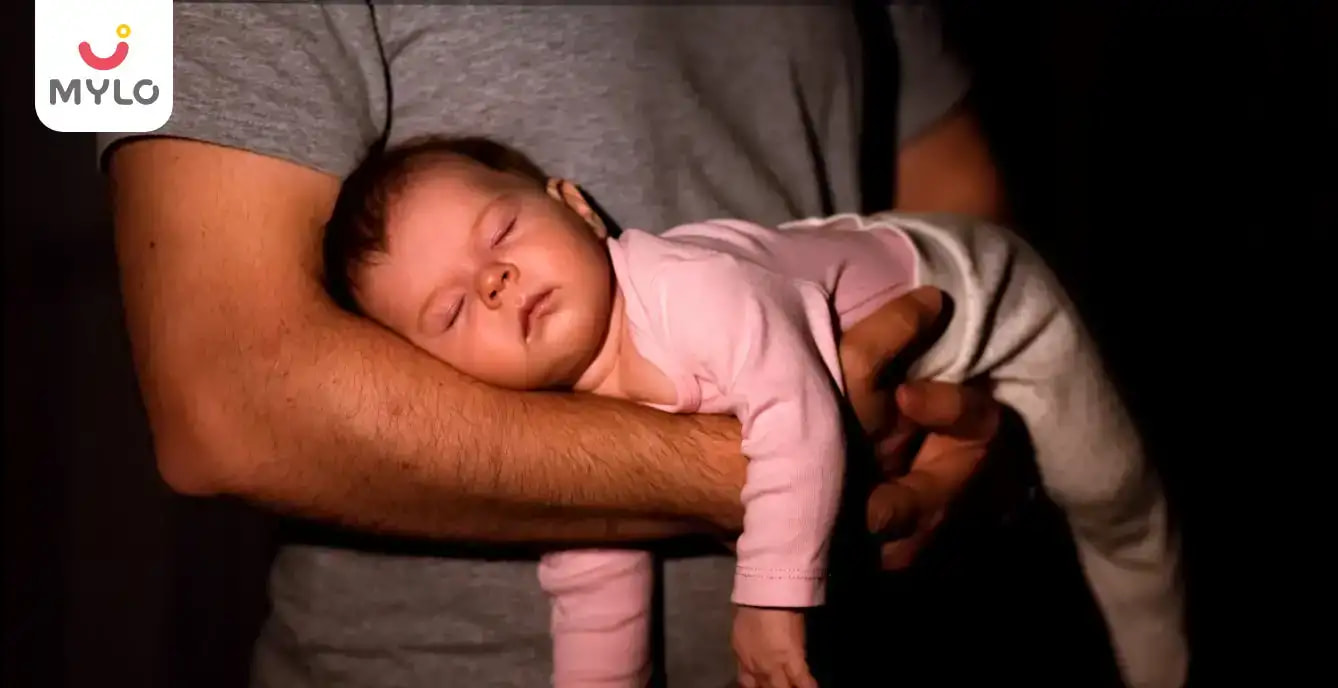Home

Baby Sleep Management

5 Common Myths Busted About Baby Sleep
In this Article

Baby Sleep Management
5 Common Myths Busted About Baby Sleep
Updated on 6 April 2023



Medically Reviewed by
Dr. Sameer Awadhiya
Dr Sameer has more than 10 Years of Experience as a specialist and more than 19 years of total experience - MBBS| DCH, DNB
View Profile

Babies are adorable, but their sleeping patterns can often be a mystery to new parents. With so much advice and opinions, it's easy for myths and misconceptions to spread about baby sleep. As a result, it can be challenging for parents to know what's accurate and what's not. In this article, we will debunk five common myths about baby sleep that are often misunderstood. By understanding the truth behind these myths, parents can help their babies get the restful sleep they need, leading to happier, healthier families. So let's get started and bust some myths!
1. Myth: Babies should sleep through the night.
Fact: It's unrealistic to expect babies to sleep through the night, especially in the first few months of life. Newborns have small stomachs and need to feed frequently, which means they will wake up during the night. It's normal for babies to wake up every two to three hours for a feed, and this can continue until they are six months or older.
2. Myth: Keeping babies awake during the day will make them sleep better at night.
Fact: It seems logical to assume that keeping babies awake during the day will make them more tired and sleep better at night, but this isn't always the case. Babies need to nap during the day to avoid getting overtired, making it harder to sleep at night. Overtired babies tend to have more difficulty settling down and staying asleep.
3. Myth: Co-sleeping is dangerous.
Fact: Co-sleeping can be safe if done correctly. Bed-sharing with babies under four months old can be dangerous, but room-sharing with a separate sleep surface, such as a bassinet or a crib, can help reduce the risk of sudden infant death syndrome (SIDS). The American Academy of Pediatrics recommends that infants sleep in the same room as their parents but on a separate sleep surface for at least the first six months of life.
4. Myth: Babies should sleep in complete silence.
Fact: Babies are used to noise from their womb, so complete silence can make it harder for them to sleep. White noise, such as a fan or a sound machine, can help soothe babies and create a more peaceful sleeping environment.
5. Myth: You can "spoil" a baby by responding to their cries.
Fact: You cannot spoil a baby by responding to their cries. Babies cry to communicate their needs, and responding to their cries helps build trust and security. Ignoring a baby's cries can lead to feelings of abandonment and can even affect their long-term mental health. It's important to respond to a baby's cries promptly and consistently.
Also read: How To Put A Baby To Sleep In 40 Seconds?
How to Promote Healthy Sleeping Habits in Babies
Establishing healthy sleeping habits in babies is essential for their growth and development. Here are some tips for promoting healthy sleeping habits in babies:
1. Set a consistent sleep schedule
Establish a regular sleep schedule and stick to it. This will help babies develop a natural sleep-wake cycle, making it easier to fall and stay asleep.
2. Create a soothing sleep environment
Create a calming and peaceful sleep environment for your baby. Keep the room dark, quiet, and at a comfortable temperature. Use a sound machine or white noise to help soothe your baby.
3. Develop a bedtime routine
Establish a calming bedtime routine, such as a bath, a lullaby, or a bedtime story. This routine will help signal your baby that it's time for sleep.
4. Encourage daytime napping
Encourage your baby to nap during the day. Naps help prevent overtiredness, which can make it harder for babies to sleep at night.
5. Avoid overstimulation before bedtime
Avoid overstimulating your baby before bedtime. Limit screen time, such as TV or mobile devices, and avoid playing with overly stimulating toys.
6. Practice safe sleep
Follow safe sleep guidelines, such as placing your baby on their back to sleep and keeping soft objects, such as blankets and pillows, out of the crib. You can also try Mylo Sleeping bag for a comfy experience for your little one.
7. Be responsive to your baby's needs
Respond promptly to your baby's cries and attend to their needs. This will help them feel secure and safe, essential for healthy sleeping habits.
Remember that every baby is different, and it may take time to establish healthy sleeping habits. Be patient and consistent, and seek advice from a paediatrician if you have concerns about your baby's sleeping patterns.





Medically Reviewed by
Dr. Sameer Awadhiya
Dr Sameer has more than 10 Years of Experience as a specialist and more than 19 years of total experience - MBBS| DCH, DNB
View Profile


Written by
Ravish Goyal
Official account of Mylo Editor
Read MoreGet baby's diet chart, and growth tips

Related Articles
RECENTLY PUBLISHED ARTICLES
our most recent articles
Ectopic Pregnancy
“Ectopic Pregnancy: All You Need to Know About This Complication”
Jan'22 Birthclub
Importance of Typhoid vaccines
Jan'22 Birthclub
Benefits of eating nuts
Jan'22 Birthclub
Can One Induce Labor Naturally?
Jan'22 Birthclub
Should One Consider Keeping Their Pregnancy A Lowkey News?
Destination decide kiya kya?
Destination decide
- After delivery pregnancy
- Mylo....
- Meri folecular study hui hai mujhe last 10, 12 din drest halka halka pain ho raha tha but kal band ho gaya kya ye period ka lakshan hai ya fir pregnancy ka
- cute baby
- Blessings
- Summer hacks that makes up your skin healthy
- Want to know
- Level 2 ultrasound report
- Aaj hum morning ko mammi ban gye ladki hui h
- Orange colour of joy and creativity
- Ek Nayi soch azaadi ki taraf
- I got to know through facebook since it was showing some useful info regarding new born baby. Many usefull information i can gather from this app. I used to panic regarding split n nose block of my new born baby similar/same question already rised by many moms n solutions also shared over here in this platform. Its really helpful for new mom who need to learn alot like me.thanks for mylo team who planned to help moms by building this wonderful platform to solve many issues for new born.
- Waiting
- Koyi batayga


AWARDS AND RECOGNITION

Mylo wins Forbes D2C Disruptor award

Mylo wins The Economic Times Promising Brands 2022
AS SEEN IN
















- Mylo Care: Effective and science-backed personal care and wellness solutions for a joyful you.
- Mylo Baby: Science-backed, gentle and effective personal care & hygiene range for your little one.
- Mylo Community: Trusted and empathetic community of 10mn+ parents and experts.
Product Categories
baby carrier | baby soap | baby wipes | stretch marks cream | baby cream | baby shampoo | baby massage oil | baby hair oil | stretch marks oil | baby body wash | baby powder | baby lotion | diaper rash cream | newborn diapers | teether | baby kajal | baby diapers | cloth diapers |








